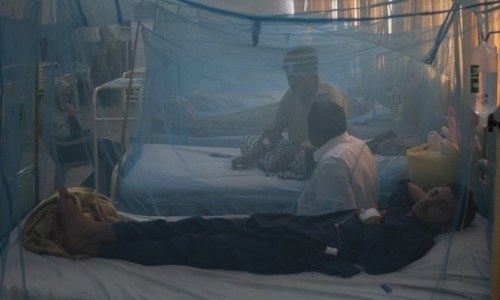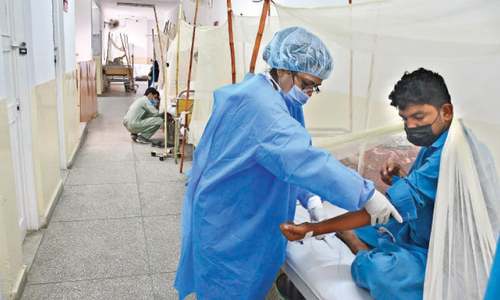RAWALPINDI: As many as 235 dengue patients landed in hospitals of the twin cities of Rawalpindi and Islamabad on Sunday.
According to data shared by Rawalpindi Medical University, the three government-run hospitals in the garrison city received 94 patients after which the tally of confirmed cases rose to 1,590, with 848 suspected patients having visited the outpatient departments of the hospitals.
The data said that at present 229 patients were under treatment in hospitals out of whom 89 were in Holy Family Hospital, 87 in Benazir Bhutto Hospital and 53 in District Headquarters Hospital.
It further revealed that 122 patients had recovered and were discharged from the hospitals on Sunday.
On the other hand, the Islamabad district administration reported 141 more dengue fever cases, taking the total number of patients in the season to 2,089.
An official of the district health department told Dawn that the capital administration had been trying to eradicate dengue mosquitoes but cases would reduce only after temperature drops in the city.
While dengue continues to infect around 100 people in Islamabad daily, District Health Officer (DHO) Dr Zaeem Zia said fumigation was being carried out across the city to eradicate the mosquito and its larva.
“We, however, are hopeful that the number of cases will start to fall by the end of the current month as the temperature is continuously dropping and it will become difficult for the dengue mosquito to survive below 22 degree celsius,” he added.
APP adds: Medical experts have advised citizens to take preventive measures to protect themselves from the dengue virus.
According to them, in the wake of increasing number of cases, citizens should properly dispose of solid waste and stop water storage practices in their residences to prevent any access to egg-laying female mosquitoes.
They said mosquitoes bred primarily in containers like earthenware jars, metal drums and concrete cisterns used for domestic water storage, as well as discarded plastic food containers, used automobile tyres and other items in which rainwater is collected.
Dr Wasim Khawaja from the Pakistan Institute of Medical Sciences (Pims) said during the past few years dengue had become a major public health concern.
He said dengue fever was a severe, flu-like illness that affected infants, young children and adults.
He said the spread of dengue was attributed to expanding geographic distribution of the four dengue viruses and of their mosquito vectors, the most important of which was the predominantly urban species, Aedes aegypti.
He said the rapid growth of the urban population was bringing ever greater numbers of people into contact with this vector, especially in areas that are favourable for mosquito breeding household water storage.
Published in Dawn, October 18th, 2021
















































Dear visitor, the comments section is undergoing an overhaul and will return soon.